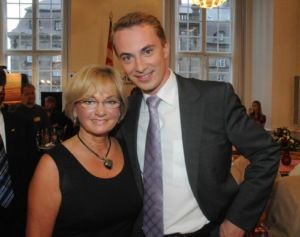News
Election Round-Up: Sometime kingmakers Dansk Folkeparti and Radikale watching from the sidelines with little hope to influence
This article is more than 3 years old.

Dansk Folkeparti increasingly looking like a spent force in Danish politics (photo: Hasse Ferrold)
Every Danish government dating back to the 1970s has been formed on the back of a majority consisting of either Radikale or Dansk Folkeparti.
But neither of the ‘kingmakers’ are doing well in the polls and looking likely to be part of the next majority.
Both likely to be frozen out
DF (2.9 percent) favours a Blue Bloc majority, which looks unlikely without the support of Lars Løkke Rasmussen’s new centrist party Moderaterne.
Radikale (4.9) is open to a more centrist majority with Mette Frederiksen remaining as PM, but it could be frozen out, as a centrist majority of Socialdemokratiet, Venstre, Konservative and Moderaterne would command 53.4 percent of the vote.
Both parties still courting controversy
Policy-wise, DF favours a large inflation package to help the elderly and wants to give elderly people the right to refuse homecare personnel who wear headscarves.
Radikale, meanwhile, has made it clear it won’t support the current government on certain measures – most notably plans to set up asylum centres outside Denmark’s borders, over which it issued an election ultimatum that PM Frederiksen gave into earlier this month.
Rasmussen’ chances of becoming PM again growing
His party is currently polling at 6.5 percent, but as many as 11 percent of the country would like to see Lars Løkke Rasmussen assume a historic third term as prime minister, according to a TV2 poll. Rasmussen’s centrist party Moderaterne is expected to play kingmaker following the result of the November 1 election, and he could step into the role if PM Mette Frederiksen is unable to form a majority. It is believed Rasmussen favours a government made up of the PM’s party, Moderaterne, Venstre and Konservative, and in such a case, Rasmussen would be the best compromise for all parties.
PM dogged by pension questions
The controversial matter of how much the pension of PM Mette Frederiksen is worth, and indeed all former politicians and ministers, has again been raised by the media. As things stand, thanks to the length of her service as an MP, minister and PM, Frederiksen is guaranteed a lifelong pension of 53,000 kroner per month. However, many blame her party Socialdemokratiet and Venstre, who together have accounted for all of Denmark’s PMs dating back to 1993, for stalling on the matter, arguing the pensions should be worth far less than they are.
Socialdemokratiet buoyed by recent Alternativet resurgence
Socialdemokratiet has taken to Twitter to applaud Alternativet on its recent reversal in fortune. Seemingly out in the wilderness due to in-fighting issues in 2021 and early 2022, the party is now on track to win 2.4 percent of the national vote following a 1.1 percent hike. Socialdemokratiet is still holding onto a slender hope that it can form a Red Bloc majority, but the emergence of Moderaterne is making it look increasingly unlikely.
Electorate nearly 50,000 larger than in 2019
The electorate has increased in size since 2019 by 48,414 eligible voters, according to the Ministry of the Interior and Housing. In total, 4,267,951 people will be able to vote. However, the figure does not include Danes abroad who are still eligible to vote.
Kristendemokraterne confirms caretaker Marianne Karlsmose as official leader
After just over five months as acting head of the Kristendemokraterne, Marianne Karlsmose has been confirmed as the official leader. Her election was unopposed as there were no candidates. She succeeds Isabella Arendt, who stepped down earlier in the year and is now bidding to be elected as a Konservative MP on November 1.
Nursing unions step up pressure on PM
Nurse union representatives have decided to use the build-up to the election to increase pressure on PM Mette Frederiksen. They chiefly want an increase in wages, arguing it will prevent nurses from finding employment in the private sector or abroad, and an increase in personnel to ease long waiting lists and overall stress at work.
Poulsen struggling to find the pieces in the dark
Konservative leader Søren Pape Poulsen has been talking up his nightlife safety policy: plans to toughen penalties for violence, rape and drunk driving. Left-wing opponents argue that tougher penalties do not lead to less crime. Meanwhile, most pundits concur that Poulsen is looking like a third wheel in PM candidate TV debates and unlikely to become Denmark’s first gay PM.
Candidate drops out following son’s accident
Danmarksdemokraterne candidate Karina Adsbøl has dropped out of her election campaign after her son was hit by a car on his way to school. He is in hospital on a respirator, and Adsbøl has said it is unlikely she will stand.
Liberal Alliance tough on climate, even if it does cost jobs
Liberal Alliance is arguing for a CO2 tax on agriculture. One of its MPs, Ole Birk Olesen, has argued that it does not matter whether the tax makes certain products more expensive, or even ends up costing jobs in the sector.
Shopping centre bans politicians
HerningCentret shopping centre in Jutland has banned politicians from campaigning within its walls. The move has been criticised by Socialdemokratiet, Venstre, Radikale and Danmarksdemokraterne.
Uncertainty the norm among voters
With less than two weeks to go before the election, 65 percent of Danes have not yet decided who they will vote for.










































